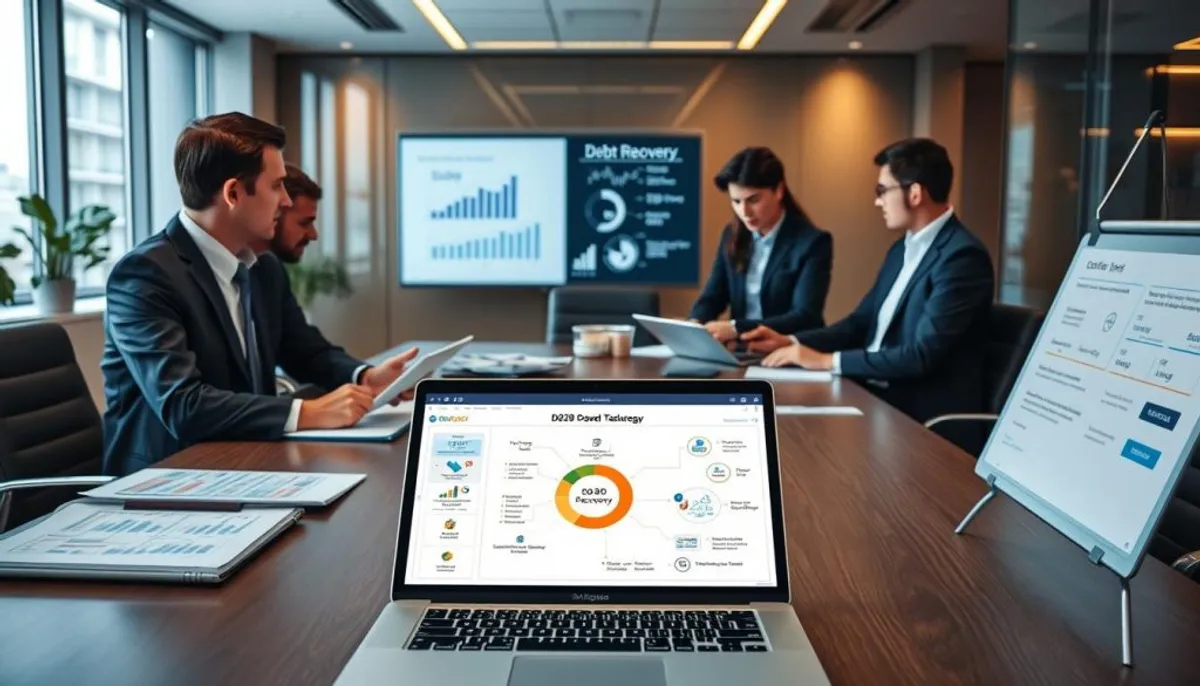Small businesses frequently face the hurdle of unpaid invoices. Delays in payment can severely impact cash flow and operational efficiency. This is where a specialized small business collection agency comes into play. These professionals are adept at managing accounts receivable, offering a vital lifeline to companies facing financial strain.
Empire Credit and Collection, a BBB accredited agency, excels in this domain. They boast an impressive 82% success rate in recovering small business debts. Their competitive pricing and no-recovery-no-fee policy make them a preferred choice for entrepreneurs looking to manage their budgets effectively.

The urgency of the debt recovery process cannot be overstated. Caine & Weiner highlights that there’s a 94% chance of retrieving payment within the initial month. This probability significantly diminishes after three months. This emphasizes the critical need for prompt action in addressing overdue accounts.
Key Takeaways
- Small business collection agencies help manage accounts receivable effectively
- Empire Credit and Collection boasts an 82% success rate for small business debts
- Swift action is crucial – 94% chance of payment recovery in the first month
- Debt collection agencies often use a three-phase process for recovery
- Professional debt recovery services can prevent cash flow problems
Understanding Small Business Debt Collection Challenges
Small businesses encounter distinct obstacles in debt collection. Unpaid invoices can severely disrupt operations, affecting cash flow and overall financial health.
Impact of Unpaid Invoices on Business Operations
Delinquent accounts pose a significant threat to small businesses. When customers fail to pay on time, it disrupts cash flow management. This can lead to inventory shortages, delayed payments to suppliers, and even damage to the company’s credit rating.
Common Payment Collection Obstacles
Small businesses often struggle with:
- Inadequate internal accounting systems
- Communication breakdowns with customers
- Lack of flexible payment options
- Limited resources for follow-up on unpaid invoices
Cash Flow Management Importance
Effective cash flow management is crucial for small business survival. Implementing proper accounting systems and working with professional debt collection agencies can significantly improve payment timing. This enhances overall financial stability.
| Strategy | Benefit |
|---|---|
| Maximum financial penalty clause | Protects financial interests, promotes timely settlements |
| Interest rate strategies | Incentivizes prompt payments, mitigates potential losses |
| Basic monthly interest rates | Simplifies calculations, enhances transparency |
By addressing these challenges head-on, small businesses can improve their debt collection processes. This ensures healthy cash flow, supporting long-term success and growth.
Collection Agency Small Business: Professional Solutions
Small businesses grappling with debt collection can find solace in professional debt recovery services. These agencies, adept at handling small business needs, employ customized strategies to reclaim unpaid debts. They do so without jeopardizing the relationships with clients.
Professional debt recovery services offer a wealth of expertise and resources, often beyond the capabilities of small businesses. They serve as an extension of your company, freeing you to concentrate on your core activities. Simultaneously, they manage the intricate process of debt recovery.
Let’s examine some pivotal statistics that underscore the prowess of professional debt collection agencies:
| Metric | Value |
|---|---|
| Years in Operation | 28 (1996-2024) |
| Accounts Resolved (Past 12 Months) | 25,300+ |
| Total Funds Recovered | $160 million |
| Consumer Complaint Rate | 0.02% |
| Cost per Account (Tier I Solution) | $24 maximum |
These statistics illustrate the efficiency and success rates of professional debt recovery services. Through strategic methods, including initial contact attempts and legal actions when required, these agencies optimize recovery. They do so while strictly adhering to legal standards.
Small businesses can greatly benefit from specialized tools, such as online portals for continuous account monitoring and tracking. This level of transparency ensures you remain abreast of the collection process. It allows you to maintain control over your accounts receivable management.
The ti3 Platform: Modernizing Debt Recovery
Small businesses encounter distinct hurdles in debt recovery. The ti3 platform presents a contemporary solution, transforming the management of overdue accounts. It leverages advanced technology to streamline the collection process.
Automated Payment Reminders System
The ti3 platform boasts an advanced automated reminders system. It dispatches timely payment notifications to debtors, obviating the necessity for manual follow-ups. This automation saves time and ensures consistent communication with clients.
Streamlined Collection Process
Ti3’s streamlined approach simplifies debt recovery. It oversees the entire collection cycle, from initial reminders to final resolution. It tracks payment statuses, escalates issues when necessary, and processes payments efficiently.
Client Relationship Preservation Features
Maintaining positive client relationships is paramount. Ti3 incorporates features designed to preserve these connections during the collection process. It enables personalized communication and flexible payment arrangements, fostering goodwill while recovering debts.
| Feature | Benefit |
|---|---|
| Automated Reminders | Consistent Follow-ups |
| Streamlined Process | Faster Debt Recovery |
| Relationship Tools | Preserved Client Connections |
By adopting the ti3 SaaS platform, small businesses can modernize their debt recovery efforts. This cost-effective solution offers the advantages of professional collection services while maintaining control over client relationships.
Benefits of Professional Debt Recovery Services
Professional debt recovery services bring significant advantages to small businesses. They streamline the collection process, freeing up owners to focus on their core operations. Let’s examine the key benefits of collaborating with a collection agency.
Time and Resource Optimization
Outsourcing debt recovery to experts conserves time and resources. Small business owners often find it challenging to consistently follow up with late-paying customers. Collection agencies, with their regular contact, enhance the likelihood of debt recovery. This frees up businesses to concentrate on growth and customer service.
Higher Recovery Success Rates
Collection agencies achieve higher success rates in debt recovery. Their expertise and resources lead to a greater percentage of successful collections compared to internal efforts. When an agency intervenes, debtors often feel a sense of urgency, leading to an increase in payments. This improvement in recovery rates positively impacts a business’s cash flow and financial stability.
Legal Compliance and Protection
Navigating debt collection laws can be complex. Reputable agencies train their staff to comply with federal and state regulations, ensuring professional and ethical service. This legal compliance protects businesses from potential lawsuits and maintains their reputation. Agencies also document all communications, providing valuable evidence for future legal actions or tax filings.
| Benefit | Impact |
|---|---|
| Time Savings | Reduced stress, focus on core business |
| Higher Recovery Rates | Improved cash flow, financial stability |
| Legal Compliance | Reduced risk, preserved reputation |
Strategic Approaches to Accounts Receivable Management
Effective accounts receivable strategies are vital for small business success. With 13% of invoice payments to SMBs made late, businesses spend an average of 16 days chasing payments. This underscores the necessity for robust invoice management practices.
Clear payment terms are the cornerstone of strong accounts receivable management. By establishing explicit expectations upfront, businesses can diminish confusion and expedite the payment process. Efficient invoicing systems are equally crucial. Electronic invoicing and online payment options can hasten the billing cycle and enhance cash flow.
Automation is a pivotal element in contemporary accounts receivable strategies. It streamlines workflows, minimizes errors, and enhances the management of overdue accounts. In fact, AR automation can cut cash collection time by up to 80% and facilitate the collection of nearly 99% of receivables.
- Set clear payment terms
- Use electronic invoicing
- Implement automation
- Offer incentives for prompt payment
Monitoring key metrics such as Days Sales Outstanding (DSO) and Average Days Delinquent (ADD) is essential for optimizing processes. Aim for a DSO below 30 days and maintain a low ADD. By concentrating on these strategic approaches, businesses can markedly enhance their accounts receivable management and ensure a consistent cash flow.
Industry-Specific Collection Solutions
Debt recovery strategies differ across industries. Effective industry-specific debt collection tailors approaches to unique sector challenges. This customization boosts recovery rates and maintains client relationships.
Service-Based Business Collections
Service industries face distinct debt recovery hurdles. CGI Credit Guard, operating since 1994, offers specialized solutions. Their team understands small business sector intricacies. They develop personalized strategies to optimize results for each client.
B2B Debt Recovery Methods
B2B debt recovery requires a nuanced approach. IC System’s Recovery Plus program provides a two-phase solution. It includes letters-only and intensive collection treatments at a flat rate. Clients keep 100% of recovered funds during the initial phase. This strategy proves effective for businesses with 50 or fewer monthly debts.

Retail and Consumer Collections
Consumer collections demand a balance between recovery and customer relations. IC System emphasizes a consumer-friendly approach. With over 85 years of expertise, they use proven strategies developed by a third-generation, family-owned business. Their methods prioritize ethical practices and partnership maintenance.
| Collection Type | Key Features | Benefits |
|---|---|---|
| Service-Based | Personalized strategies | Optimized results |
| B2B | Two-phase approach | 100% client retention of initial recoveries |
| Retail/Consumer | Consumer-friendly methods | Preserved customer relationships |
Choosing the right industry-specific debt collection solution can significantly impact recovery success. It’s crucial to partner with agencies that understand your sector’s unique challenges and regulations.
Technology Integration in Modern Debt Collection
Debt collection technology is transforming the industry, enabling businesses to recover payments more efficiently. The market for these solutions is expanding rapidly, projected to hit $7.19 billion by 2028. This surge underscores the escalating demand for effective, compliant, and customer-centric collection methods.
Digital Payment Processing Systems
Digital payments have revolutionized the collection process. These systems expedite transactions, cutting down on delays and boosting cash flow. Self-service portals empower customers to resolve payment issues autonomously, reducing the need for human intervention and enhancing the overall experience.
Data Analytics and Reporting
Data analytics is pivotal in modern debt recovery. It consolidates data from diverse sources, offering businesses deep insights into debtor behavior and payment habits. This data-driven strategy optimizes collection tactics, leading to enhanced success rates.
Communication Automation Tools
Automation is essential for efficient debt collection. AI tools automate tasks such as sending reminders and tracking payments. These systems have demonstrated significant efficacy, with AI reminders boosting payment timeliness by up to 50%.
| Technology | Impact | Benefit |
|---|---|---|
| AI-powered reminders | 50% improvement in payment timeliness | Reduced delays, improved cash flow |
| Conversational AI | Immediate flexible payment plan proposals | Increased debtor engagement |
| Cloud-based software | Centralized data management | Improved operational efficiency |
By adopting these technological innovations, businesses can significantly improve their debt recovery processes. This leads to better compliance, enhanced customer relationships, and ultimately, a more robust financial performance.
Maintaining Customer Relationships During Collections
When it comes to debt collection, preserving customer relationships is paramount. Adopting a diplomatic approach can enable small businesses to uphold their integrity while recovering funds. Utilizing non-confrontational methods ensures interactions remain professional, avoiding tense exchanges.
Research indicates that open communication can elevate debt collection success rates by 40%. Providing flexible payment options can increase debtor responsiveness by 30%. These findings underscore the significance of customer relationship management in the collection process.
Professional agencies are adept at navigating the fine line between debt recovery and client retention. They employ strategies that fulfill financial obligations without alienating clients. This is vital, as retaining an existing customer is significantly less costly than acquiring a new one.
- Practice active listening to improve customer interactions
- Show empathy towards clients facing financial difficulties
- Offer payment plans to make debt resolution manageable
- Follow up conversations with clear, written agreements
It’s worth noting that over 30% of communication is conveyed through tone and word choice. Maintaining a calm and professional demeanor during difficult conversations can facilitate debt recovery discussions. By prioritizing customer relationship management, businesses can address payment issues while safeguarding valuable connections for future opportunities.
Legal Framework and Compliance Standards
Debt collection laws are pivotal in safeguarding consumers while enabling businesses to reclaim owed funds. The Fair Debt Collection Practices Act (FDCPA) establishes the ethical standards for debt collection in the United States.

Fair Debt Collection Practices Act Guidelines
The FDCPA regulates debt collection agencies, defining permissible communication with consumers. It bars practices deemed abusive, such as contacting at inconvenient hours or disclosing debts without consent. For instance, collectors must refrain from calling before 8 a.m. or after 9 p.m. without explicit consent.
State-Specific Collection Regulations
Though the FDCPA offers federal protection, state laws often mandate additional compliance. These can include licensing requirements for collection agencies, specific communication protocols, or enhanced consumer safeguards. Businesses must adhere to both federal and state regulations to maintain compliance.
Consumer Protection Requirements
Consumer protection in debt collection transcends the FDCPA. The Equal Credit Opportunity Act prohibits discrimination in credit offerings. The Truth in Lending Act demands transparent disclosure of credit terms. The Fair Credit Billing Act empowers consumers to contest billing errors within 60 days.
| Law | Key Requirement |
|---|---|
| FDCPA | Prohibits abusive collection practices |
| Equal Credit Opportunity Act | Bans discrimination in credit offerings |
| Truth in Lending Act | Requires clear disclosure of credit terms |
Compliance with these laws is essential for businesses involved in debt collection. It ensures legal adherence and builds consumer trust, striking a balance between debt recovery and ethical practices.
Conclusion
Small business debt recovery is essential for maintaining financial stability. Professional collection services offer effective solutions for companies facing unpaid invoices. They utilize expertise, advanced technology, and legal knowledge to efficiently recover debts.
The ti3 platform and similar tools provide cost-effective alternatives to traditional methods. They enable small businesses to concentrate on growth while ensuring a steady cash flow. By employing these services, companies can optimize their time and resources, achieve higher recovery rates, and safeguard their legal interests.
Professional debt collection services are a crucial asset for small businesses. They help maintain customer relationships while ensuring financial stability. As the business environment evolves, these services will continue to adapt, offering customized solutions for various industries. This ensures the ongoing financial health of small enterprises.
RelatedRelated articles



